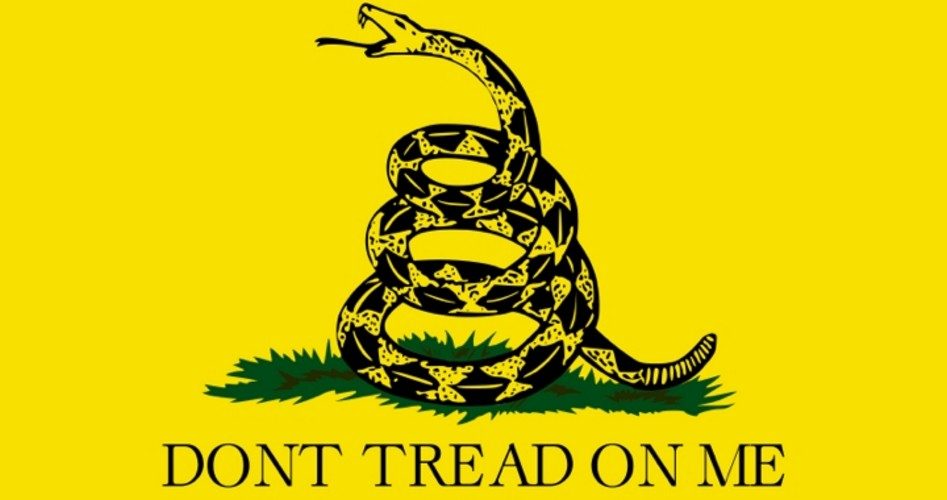
Be careful what you say. Be careful what you wear. Be careful what you believe.
In an era when truth is becoming treason, it is unlikely to surprise anyone to learn that the Obama administration is pushing to crack down on complaints of racism, sexism, and belief of traditional gender roles.
Earlier this month, the Equal Employment Opportunity Commission (EEOC) pursued a workplace complaint filed by one employee claiming that another employee wearing a cap displaying the Gadsden Flag (“Don’t Tread On Me”) was creating a “hostile work environment.”
As reported by Eugene Volokh in the Washington Post, a man filed a formal complaint with the EEOC in January of this year alleging that a co-worker’s wearing of a cap with a Gadsden Flag “subjected him to discrimination on the basis of race (African American).”
The unnamed complainant reported that “he found the cap to be racially offensive to African Americans because the flag was designed by Christopher Gadsden, a “slave trader & owner of slaves.”
Continuing his complaint, the offended employee claimed the Gadsden Flag was known to be:
an historical indicator of white resentment against blacks stemming largely from the Tea Party.” He notes that the Vice President of the International Association of Black Professional Firefighters cited the Gadsden Flag as the equivalent of the Confederate Battle Flag when he successfully had it removed from a New Haven, Connecticut fire department flagpole.
The employer rejected the complaint, finding its claims insufficient to prove the allegations levied against the employee.
The federal government didn’t agree and the EEOC reinstated the case, ruling that “whatever the historic origins and meaning of the symbol, it also has since been sometimes interpreted to convey racially tinged messages in some contexts.”
A similar decision handed down by the EEOC in 2014 held that wearing the Confederate flag to be “actionable harassment.”
There is a marked movement by the regime and its several dependent departments to balkanize the population into two groups: those who support that state — regardless of the justness of its actions — and those whose opposition to the oligarchy is manifested in speech or clothes.
The latter group will be subjected to the full brunt of the bureaucracy’s bludgeon. The accused may either accept the admonition and capitulate, or carry on criticizing the status quo and be driven from his employment and branded forever with the mark of a racist, sexist, secessionist, or other pariah.
An important consideration of this case (Shelton D. [pseudonym] v. Brennan) is that the EEOC is not preparing to rule on one narrowly tailored incident of alleged racial hostility, leaving private employers at liberty to decide disputes between their employees.
No, the Obama administration’s decision to overrule the employer’s initial dismissal of this complaint will cast a long legal shadow over all employers, public and private. Local considerations, previous patterns of behavior, and an employer’s appreciation of what is likely legitimate and what is not will be precluded, and the federal government will enforce one standard of an acceptable work environment.
Should an employer forget his subordination to the federal employment kritarchy, he and his company will be laid open to legal ramifications that could ruin both the businessman and the business.
Notice, also, that in the case highlighted by the Volokh article, the complaint contains no allegation of actual racist (or racially hostile) statements made by the target of the investigation to the filer of the complaint. That is to say, life-changing charges of racism (or other outlawed -ism) do not now have to be based on hostile facts, but on hurt feelings.
Consider the following prediction, written by Volokh, of the chilling effect the ruling regime’s regulations will have on the day-to-day deportment of employers around the country and their gradual conversion into enforcers of the federal “feelings” code:
Imagine that you are a reasonable employer. You don’t want to restrict employee speech any more than is necessary, but you also don’t want to face the risk of legal liability for allowing speech that the government might label “harassing.” An employee comes to you, complaining that a coworker’s wearing a “Don’t Tread on Me” cap — or having an “All Lives Matter” bumper sticker on a car parked in the employee lot, or “Stop Illegal Immigration” sign on the coworker’s cubicle wall — constitutes legally actionable “hostile environment harassment,” in violation of federal employment law. The employee claims that in “the specific context” (perhaps based on what has been in the news, or based on what other employees have been saying in lunchroom conversations), this speech is “racially tinged” or “racially insensitive.”
Would you feel pressured, by the risk of a lawsuit and of liability, into suppressing speech that expresses such viewpoints? Or would you say, “Nope, I’m not worried about the possibility of liability, I’ll let my employees keep talking”? (Again, the question isn’t what you may do as a matter of your own judgment about how you would control a private workplace; the question is whether the government is pressuring you to suppress speech that conveys certain viewpoints.)
Despite the danger presented by the usurpation of the federal employment bureaucracy of the authority of arbitrating all allegations of racial (or other) intolerance in the workplace, there are some who would prefer an enlargement of the scope of behavior (or the perception of unexpressed though “obvious” hostility) that would be subject to the sensitivity czars. In response to the original article penned by Volokh, Harvard law professor Noah Feldman made the following outrageous observation: “If someone says in the workplace that Hillary Clinton shouldn’t be president because women shouldn’t work full-time, that’s a political statement. Yet it could also be part of the pattern of sex discrimination in a hostile work environment.”
Volokh pointed out that there is nothing in Feldman’s recommendation that would apply to only candidate Clinton.
“If Clinton is elected, criticizing her actions as president on the grounds that her sex is causing her to act unsoundly would likewise help create a ‘hostile work environment.’ Employers would thus be obligated to suppress such criticisms by their employees or face the risk of massive civil liability,” he warns.
Can you imagine? Should the EEOC’s quest to quell dissension succeed, you will be a potential target of federal prosecution for sexism should you deign to criticize Hillary Clinton — for any reason!
Be warned: Your freedom to express (or to be perceived to be expressing) even the slightest criticism of the president or other member of the ruling class — no matter how well-founded, logically sound, or absolute devoid of any racist or sexist animus — could cost you your job, your money, and the property dependent on your keeping those things.
The EEOC’s published decision puts the question of resistance to rest: “Compliance with the Commission’s corrective action is mandatory.”



